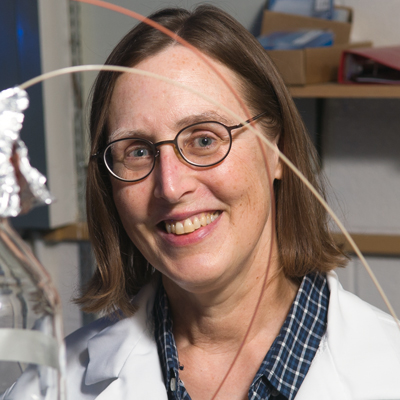Understanding the functions of lipid dynamics during plant stress
A field of lush, green plants only thrives if the plants are able to respond to their environment. Drought, disease, and lack of critical plant nutrients are only examples of the types of stress that affect plants on both a visible level and, as Dr. Ruth Welti, of Kansas State University, is discovering, inside their cells’ cores. Lipids, the overarching focus of Dr. Welti’s research, are compounds that form the structure of plant cell membranes. Some lipids play a crucial role in photosynthesis. Lipids can also go from being part of a plant’s structure to being signals. It’s as if little hunks of the plant itself are transformed into messages that tell the plant how to survive tough times. Dr. Welti and her colleagues are working to read the messages. She aims to characterize the lipids and their changes upon stress and the genes underlying the changes. By establishing a profile of these key factors, agriculture would gain a direction for selective breeding of plants that are more resilient to environmental stresses. Knowing which genes metabolize lipids also may lend insight into some of the thousands of genes in humans whose functions are not currently understood by scientists.
Dr. Welti is one of the few scientists involved in using mass spectrometry -- a method for analyzing chemical makeup -- to study plant lipids. This method lets scientists learn about lipids and their composition much more rapidly than other approaches. She is the director of the Kansas Lipidomics Research Center, a unique facility for mass spectrometry research, while leading a diverse team of investigators within her own research group. Each of her team members have years of lipid research experience and together they have a colorful portfolio of skills related to understanding lipids, their metabolism, and their analysis. Additionally, her group has many collaborators, including plant biologists Xuemin “Sam” Wang of University of Missouri-St. Louis and Jyoti Shah of University of North Texas.
Current research efforts include:
-
Searching for Genes: Dr. Welti is investigating lipid-metabolizing genes that are expressed while plants are under stress. While her group has made significant progress in characterizing candidate genes, they need additional funding to confirm the function of each of these genes.
-
Analyzing the Roles of Specific Lipids: When plants suffer stress from the environment, they modify and transform their lipid compositions. Analyzing the ability of specific lipids to protect plants from environmental stressors is a promising approach to identifying ways to improve plant stress tolerance.
-
Leading the Lipidomics Center: As the director of the Kansas Lipidomics Research Center, Dr. Welti’s priorities include leading her research group to scientific breakthroughs and helping hundreds of other scientists gain information about lipids to answer their research questions.
Bio
Growing up in a small town didn’t stop Dr. Ruth Welti from becoming a scientist. Although her childhood provided no specific role model to direct her into the field, Dr. Welti recognized upon entering college that science was a perfect space for her to blossom. This began the journey that brought her to where she is today. She has two daughters also becoming biologists.
Dr. Welti’s fascination with mass spectrometry comes from a love for numbers and puzzle solving. It also helps to think that, by furthering research that could foster better agriculture, there will come a day when people around the world will have enough to eat.
Dr. Welti is a lifetime member of the Girl Scouts. She was one of six women in the Kansas City area honored by Girl Scouts as heroines in STEM.
For more information, please visit: http://www.k-state.edu/lipid/lipidomics/
In the News
Kansas State University
http://www.k-state.edu/biology/people/tenure/welti/index.html
Kansas State University
Publications
Awards
Pearl Award (an award for excellence in science, technology, engineering, or math), Girl Scouts of NE Kansas and NW Missouri, 2013
https://www.girlscoutsksmo.org/donor/Documents/recipient-bios.pdf
AAAS (American Association for Advancement of Science) Fellow, Section on Biological Sciences, 2012
http://my.aspb.org/blogpost/700954/154832/Thirty-Four-ASPB-Members-Elected-to-2012-Class-of-AAAS-Fellows
University Distinguished Professor, Kansas State University, 2012
http://www.k-state.edu/media/newsreleases/apr12/udp43012.html
Sigma Xi, Kansas State University Chapter, Outstanding Senior Scientist Award, 2008
http://www.k-state.edu/media/k-statement/vol30/61908k-statement.html
Kansas Technology Enterprise Corporation Scholar, 2006
See page 8: http://www.k-inbre.org/documents/2007%20Winter%20K-INBRIEF%20Newsletter.pdf


